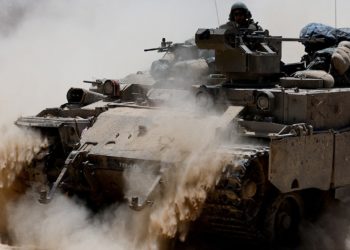Researchers say the long-term survival of bees is at risk due to wars including Russia’s full-scale invasion of Ukraine.
Conflicts worldwide are causing farmers to overexploit available land and reduce crop variety, which in turn limits the availability of food for wild pollinators, according to a new report published Tuesday — which is World Bee Day — by the Bee: wild advocacy group and the University of Reading.
Heavy metal pollution, another common side effect of wars, is also an emerging threat to the species.
“Pollinators are central to our food systems, climate resilience, and economic security. Protecting pollinators means protecting ourselves,” said Simon Potts, professor of sustainable land management at the University of Reading and the study’s lead author.
The researchers identified other emerging threats to bees including microplastics, air and light pollution, and the use of pesticides.
Some actions aimed at combating climate change can also harm pollinators, the report noted, pointing to the European Commission’s goal of planting 3 billion trees by 2030, which could decrease biodiversity.
Increased indoor farming and mining of metals used in batteries also damage natural habitats for wild pollinators.
The report urges policymakers to strengthen pollution regulations and reduce the use of pesticides. Though the EU bans the use of certain pesticides harmful to pollinators, Romania has defied the prohibition, including in January, exposing weaknesses in enforcement.
The report also calls on international organizations and economic blocs, including the EU, to cooperate on global policies protecting pollinators while commending the EU Nature Restoration Regulation, adopted in June 2024, as a “major step forward.”
The post Putin and microplastics threaten bees’ survival appeared first on Politico.




